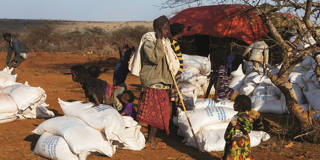For decades, development aid has gone either to governments that lack the ability to administer it, or to non-government actors who essentially compete with the state. It is time for a new approach centered on a less ambitious but far more practical objective.
CHICAGO – Development aid is one of the most important policy tools that rich countries have for transferring resources to help poor ones. Between 1960 and 2013, OECD countries gave $3.5 trillion (in 2009 dollars) of official development assistance (ODA). Approximately $568 billion (in 2003 dollars) went to African countries.
But the efficacy of ODA is a source of much controversy. Former World Bank economist William Easterly and the Nobel laureate economist Angus Deaton separately argue that aid has failed to drive continued improvements in poor countries, and may even have made conditions worse. Going further, the economist Dambisa Moyo contends that aid has merely increased developing countries’ dependence on foreign assistance.
These and other critics worry that the availability of foreign aid might reduce recipient governments’ incentives to improve their countries’ own institutions. Because aid money can be – and often is – stolen by those in power, it can fuel corruption, or be used by armed groups to sustain violent conflicts. And to the extent that aid intensifies competition for scarce human-capital resources like doctors, nurses, and teachers, it can hinder the development of state capacity.

CHICAGO – Development aid is one of the most important policy tools that rich countries have for transferring resources to help poor ones. Between 1960 and 2013, OECD countries gave $3.5 trillion (in 2009 dollars) of official development assistance (ODA). Approximately $568 billion (in 2003 dollars) went to African countries.
But the efficacy of ODA is a source of much controversy. Former World Bank economist William Easterly and the Nobel laureate economist Angus Deaton separately argue that aid has failed to drive continued improvements in poor countries, and may even have made conditions worse. Going further, the economist Dambisa Moyo contends that aid has merely increased developing countries’ dependence on foreign assistance.
These and other critics worry that the availability of foreign aid might reduce recipient governments’ incentives to improve their countries’ own institutions. Because aid money can be – and often is – stolen by those in power, it can fuel corruption, or be used by armed groups to sustain violent conflicts. And to the extent that aid intensifies competition for scarce human-capital resources like doctors, nurses, and teachers, it can hinder the development of state capacity.